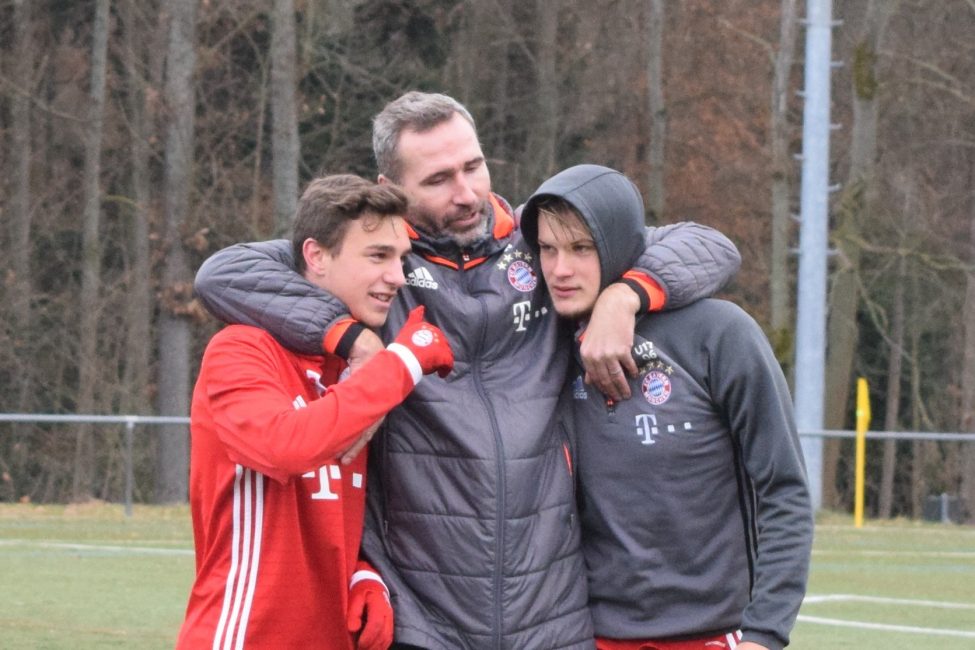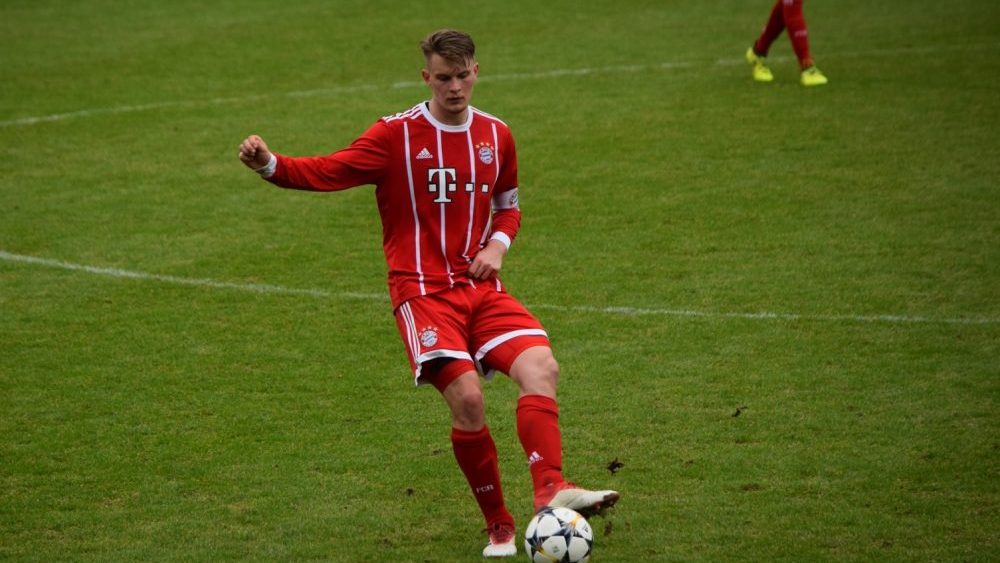“I always wanted to play for Bayern” – Lasse Mai interviewed
Lasse, 2017 was an unbelievable year for you. German champions with the Under-17s, success with the national team – tell us how it all went from your point of view.
It was definitely a special year. With Bayern after the south German title, which we’d secured after the game against Stuttgart at the end of April, we had a real fire in the team. That connection between team and coaching staff with Tim Walter and Tobi Schweinsteiger was really brilliant, for sure.
Was there any specific moment for you that you’d pick out?
Being able to accept the championship trophy as captain was definitely my personal highlight. The whole team piled up behind me. I still get goosebumps from it today…
You guys properly celebrated afterwards, right?
We did a bus tour through the city, and then after that we went to a club, that was an unforgettable party – at some point everyone was on the dance-floor, even though none of us can properly dance (laughs).
And just before that you were also with the Under-17 national team for the Euros?
Exactly, I got to go along to Croatia. Qualifying for the tournament was so cool. For the whole team, because eventually we qualified for the finals, but also for me personally, because I managed to establish myself as a key player again.
The finals went really well for a while for you guys too.
In the preliminary round we played really well, we had three wins and a goal difference of 15:1. In the quarters we turned the game in the last 15 minutes and beat the Netherlands 2:1 – those are special moments that shape you and where a team grows together too. Even though we then went out unluckily against Spain, the Euros were a great experience.
As well as that, as semi-finalists you were able to win a place at the Under-17 World Cup in October in India. Another highlight for you, right?
Above all not just in a footballing sense. How often do you get the chance to travel to India? At first we really had to get used to the climate, and the whole sideshow was a real challenge. We were cared for fantastically well by the DFB, had a big support team with physiotherapists and so on. Even though we were knocked out in the quarter-finals by Brazil, I’m not going to forget the experience I gained in India any time soon. Alongside the tournament we also had time to check out the five cities we played in.
Let’s jump forward to January 2018, when you got to go with the senior squad to the training camp. When did you even find out about it?
Hermann Gerland had called me and told me about it. That was obviously something special, to be able to come along with all those big names, my whole family was so happy for me.
Were your experiences from 2017 able to help you in a way at first?
It’s definitely different, suddenly getting to train next to World Champions and Champions League winners. When I came into the dressing room for the first time, I was a bit unsure of where I should sit for example – there Felix Götze was able to then help me, and he showed me around a bit in the first days.
What did you sing for your initiation?
I sang “An Tagen wie Diesen” – but I’m definitely better on the turf than on the microphone, singing isn’t really my thing (laughs).
As we’ve seen, or rather heard, with Sandro Wagner, you’re not alone there. Do the experienced players actually speak to you a lot as the newcomer?
When I was still a bit shy in the first few days, they came up to me and said I didn’t have to hold myself back, and could go ahead and be a bit cheekier. That was really helpful, and since then I also go a lot more up to them and ask them quite openly what I can do better.
Did you have the feeling that you were able to keep up in training?
At the beginning you obviously need a few sessions, but nowadays I feel really good, and I can apply what I learn with the senior squad directly when I play with the Under-19s.
What specifically do you learn with the senior squad?
Peter Hermann for example teaches me a lot in a footballing sense. Which pass should I play when, and how strong – I often then work specifically on things like that with him after training. Hummels and Boateng also speak to me a lot, in particular Hummels has a really good style and is always positive. I’ve also taken on that type of criticism, which helps me as captain with the Under-19s.
In what way?
I am actually someone who wants to address and improve negative things immediately. However this is often wrong, it is much better to always be positive in the game and to deal with the mistakes in a moment of peace.
At your age, it’s important to learn from such mistakes. In the UEFA Youth League against Real Madrid, you made such a mistake and conceded a goal. How do you deal with it and who do you talk to about it?
I watched the game again in full length and of course this scene. That was extremely annoying because I simply did not know exactly what to do in the situation. Sebastian Hoeneß then approached me and explained to me exactly how I could have done better.
You have to learn to deal with criticism first, right?
To be honest, until I talked to Joshua Kimmich, I had trouble accepting criticism.
What did Kimmich tell you?
We talked in Doha about how to deal with criticism as a young player. He said it’s best to filter the advice that people are giving you: When something makes sense, you accept it.
In your youth you almost ended up at VfB Stuttgart like Kimmich?
Yeah, but I always wanted to play for Bayern. They were the greatest club in the world. When I first trained on Säbener Straße, I could hardly believe it. Moving into boarding school there at 14 was an incredibly important step in my career.
When you came to FC Bayern, the work of the next generation did not have the best reputation. Did that matter to you?
No, not at all. The offer was an opportunity I didn’t want to miss – and I didn’t feel that way about the bad reputation either. The level at FC Bayern was much higher than in Dresden.
One of the most important promoters at FC Bayern was certainly Tim Walter, who trained you at the age of 15. How would you describe his style?
Tim Walter is all about football on the pitch – if the performance is not right, he can be tough at times. But he’s also a real friend who I can talk to about anything at any time.

Where do you currently see the greatest need for improvement?
I can get even faster at the first few meters while sprinting. I run a lot, but I’m sure I still have potential there.
Can you train better now that you’re at home on campus?
Yes, absolutely. Here everything is automatically monitored and analysed – in Säbener Straße it was different. We also installed light barriers in the basketball hall to be able to measure data as well. Everything has become more professional with the campus.
Has your daily routine changed a lot because you moved to the campus?
Absolutely. Here, for example, we have much better opportunities to work individually with the fitness trainer in the gym. In the mornings I am mostly with the professionals, then I have time here in the afternoons for my own training.
Does the campus also have disadvantages?
There are no disadvantages compared to before. The great thing about Säbener Straße was that you were very close to the professionals, you could watch them training every day. Here we have a separate place for each team and significantly better training opportunities.
Thank you Lukas for the interview and all the best for the rest of the season!




 March 22, 2018
March 22, 2018 


